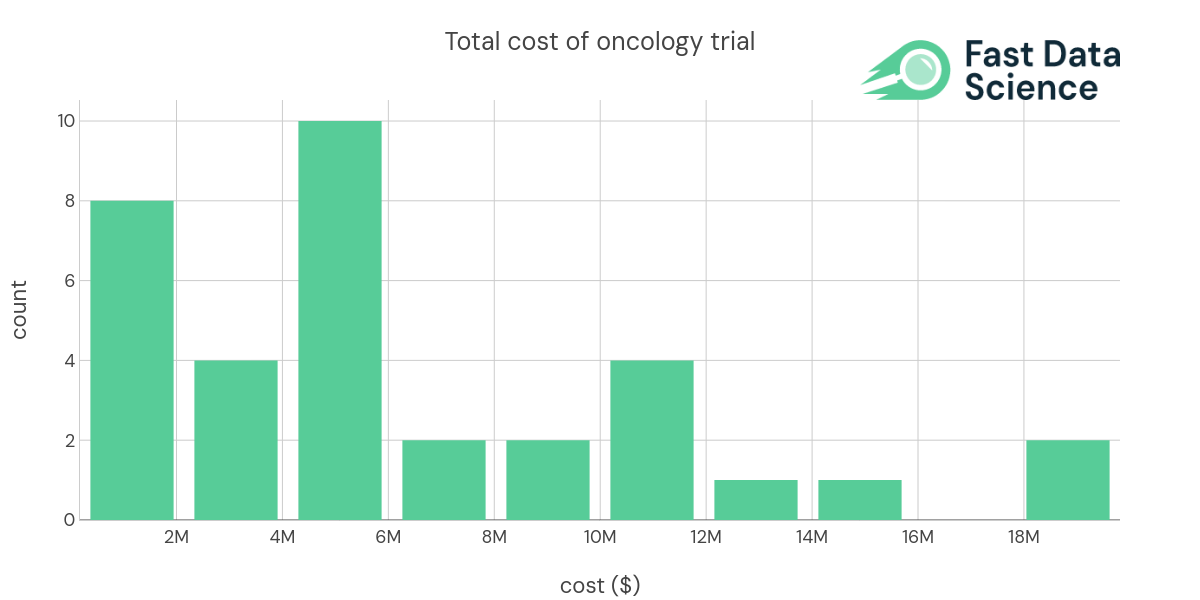Clinical trials are a cornerstone of medical progress, but their high cost can be a barrier to innovation.
The cost of randomized controlled trials can vary widely depending on several factors, making it difficult to estimate the financial investment needed before diving into a trial.
Several factors can affect how much a clinical trial costs:
A study by Martin et al. (2017) explores the economic factors influencing clinical trial costs in more detail: https://doi.org/10.1038/nrd.2017.70

Below you can see part of a public dataset of trials where the costs are known and available. We use data sources like these to train our models.
You can download the (public) dataset of cost data here and the original source online is here.
| indication (longer) | Technology | CT.gov URL | Enrollment | Trial Phase | Total Cost | Per Patient Cost ($PP) |
|---|---|---|---|---|---|---|
| Advanced Myeloid Malignancy | biologic drug | 30 | Phase 1 | 328000 | 10933.3 | |
| Blood Cancer | biologic drug | NCT03483324 | 9 | Phase 1 | 5000000 | 555556 |
| Blood Cancer | biologic drug | NCT03925935 | 24 | Phase 1 | 6192579 | 258024 |
| B cell cancers, Leukemia | biologic drug | NCT03088878 | 156 | Phase 1/2 | 18292674 | 117261 |
| Blood Cancer | biologic drug | NCT02222688 | 26 | Phase 1 | 4179598 | 160754 |
| Colon Cancer | biologic drug | NCT02953782 | 112 | Phase 1/2 | 10234048 | 91375.4 |
| Leukemia, Acute Myeloid (AML) | biologic drug | NCT03248479 | 96 | Phase 1 | 5000000 | 52083.3 |
| Blood Cancer, Solid Tumors | biologic drug | NCT02216409 | 88 | Phase 1 | 6505568 | 73926.9 |
| Breast Cancer | biologic drug | NCT00781612&draw=2&rank=1 | 720 | Phase 3 | - | 104186 |
Estimating clinical trial costs accurately can be challenging due to the variability in these factors. The complexity of protocols, often lengthy and written in technical language, makes manual analysis time-consuming and prone to error.
Fast Data Science has developed a tool for the Gates Foundation that leverages machine learning to address this challenge. This Clinical Trial Risk Assessment Tool utilizes Natural Language Processing (NLP) to analyze clinical trial protocols.
We originally developed the tool to cover Tuberculosis and HIV trial cost estimation, and has since been extended to cover other disease indications including COVID, Cystic fibrosis, Enteric and diarrheal diseases clinical trials cost models, Influenza clinical trials cost modelling, Malaria clinical trials cost models, Motor neurone disease, Multiple sclerosis, Neglected tropical diseases clinical trials cost modelling, Oncology, and Polio clinical trials cost modelling.
Fast Data Science’s Clinical Trial Risk Tool is a valuable innovation in the field of clinical research. By harnessing the power of machine learning, this tool can help to improve the efficiency and affordability of clinical trials, ultimately accelerating medical progress.
We have developed a quick in-browser clinical trial cost calculator which lets you input key factors of your trial and which can estimate the cost. You can try it here.